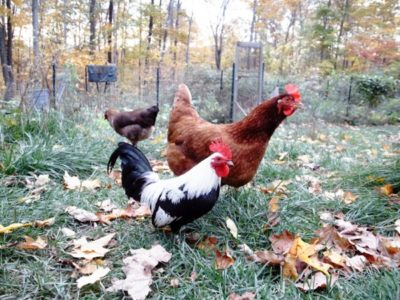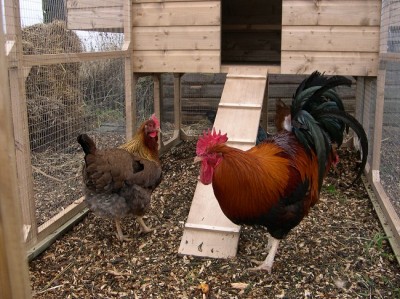Many of the cleaners used on chicken coops, like bleach and aerosol sprays, can have disastrous effects on a flock. Chickens are very susceptible to respiratory illnesses and cleaning a coop with harsh chemicals can cause problems. Let me share how to clean your coop more naturally and still leave it smelling fresh (and even like an herb garden) when you are finished.
It can be helpful to set up a cleaning schedule and routine. Depending on the coop size and design and flock size, your coop may need a cleaning every two weeks, once a month, or once a season. If your birds have problems with insects and parasites, you may need to clean more often. A good rule of thumb for regular cleaning is to clean when an ammonia smell becomes evident.
Assemble your cleaning supplies ahead of time. A bucket or cleaning caddy can keep these organized and help you avoid having to search for things at the last minute. Rubber gloves, scrub brushes (various sizes and lengths for reaching hard-to-get-at areas), white vinegar, Dawn dishwashing soap, orange peel and White Vinegar Coop Cleaner (recipe below), food-grade diatomaceous earth, a second bucket and scissors for cutting fresh herbs will all come in handy.
A month before coop cleaning day, start brewing your orange peel and white vinegar coop cleaner. You will need four oranges (peels only), two cinnamon sticks, two vanilla beans, a bottle of white vinegar, two canning jars and a spray bottle. Put the orange peels in two jars (dividing them equally). Then break each cinnamon stick and put two pieces in each jar and slit the vanilla beans and place one in each jar. Pour the white vinegar over top of everything and tighten the jar lids. Set this aside for about a month, shaking occasionally. After a month, you can pour just the liquid into your spray bottle. This makes a fragrant and safe cleaner that repels insects, kills mold, and works as a solvent and disinfectant.
Packed full of information on some of the key aspects of raising chickens.
On coop cleaning day, begin by airing the coop out as well as you can and then raking or shoveling out the old bedding. If you are sensitive to smells and chicken fluff, you may benefit from wearing a mask. This is another good reason (second to your flock’s well-being) to tackle coop cleaning before the ammonia smell builds. Once most of the bedding is out, you can sweep the remaining bits out with a broom.
 Next, take a bucket of water and add some vinegar and Dawn dishwashing soap and scrub the floor, nest boxes and roosts. Basically, scrub anything that the chickens come in contact with. Long-handled scrub brushes can be especially useful in reaching difficult areas. Take your home-brewed coop cleaner and spray down the floors, nest boxes and roosts. If you notice mites anywhere (just rub your finger over an area and any blood colored patches that appear signal a mite presence), spray these areas liberally.
Next, take a bucket of water and add some vinegar and Dawn dishwashing soap and scrub the floor, nest boxes and roosts. Basically, scrub anything that the chickens come in contact with. Long-handled scrub brushes can be especially useful in reaching difficult areas. Take your home-brewed coop cleaner and spray down the floors, nest boxes and roosts. If you notice mites anywhere (just rub your finger over an area and any blood colored patches that appear signal a mite presence), spray these areas liberally.
The last thing to do to clear out mites or other parasites is to sprinkle food-grade diatomaceous earth (DE) over the coop. Pay close attention to the roosts where mites love to hide out. Be sure to keep the chickens out of the coop and do not breathe the dust yourself, as DE dust can be very irritating to the lungs. A mask may be helpful here, too.
As a final touch, pick some fresh herbs and sprinkle them in the nesting boxes. Mint, basil, lemon balm, lavender and rose petals are great options. Various herbs work as insecticides and repellants and have anti-bacterial and anti-parasitic properties. They can also serve as stress-relievers and even laying stimulants. Wild birds have been known to line their own nests with essential oil containing leaves and flowers and your chickens will love them. Then step back and enjoy the clean, sweet smelling coop.
Between coop cleanings, it may be helpful to make a coop freshening spray (recipe below) and periodically mist the nest boxes and floor with it. These essential oils and extract have insect repelling, disinfecting and calming properties. Dawn soap is considered a gentle and effective cleaner, safe for use on wild animals, so it should be fine for your chickens. Mix together 4 ounces of Dawn lavender dishwashing soap, 12 ounces of water, 10 drops of grapefruit seed extract, 10 drops of tea tree oil, 10 drop of peppermint oil, and 10 drops of lavender oil. Put this in a spray bottle and use it whenever you want to freshen up the coop a little.
While coop cleaning is certainly not a popular chore, by following the above steps, you can make it a simple and effective process. Using the coop freshening spray and periodically placing fresh herbs in the nest boxes can help maintain a pleasant odor longer. If coop cleaning is still too labor intensive for your liking, consider setting up a removal poop collector, like a poop hammock. This can help cut down on time and energy while still ensuring that you keep your birds as healthy as possible with a clean coop and minimal odor buildup.
Sign up for Off The Grid News’ weekly email and stay informed about the issues important to you
 Off The Grid News Better Ideas For Off The Grid Living
Off The Grid News Better Ideas For Off The Grid Living





